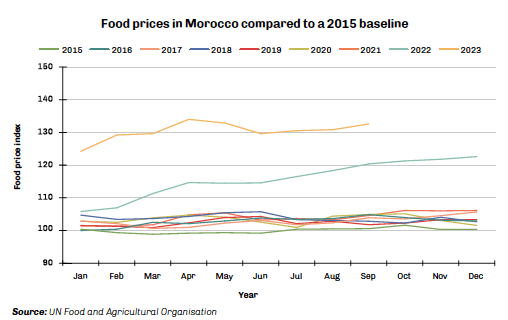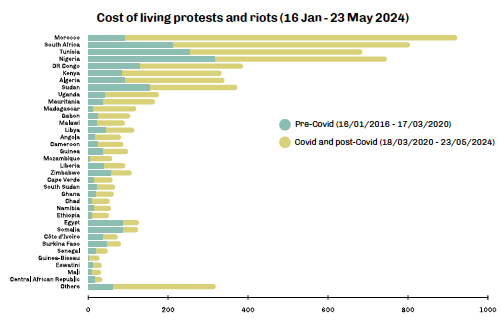A gateman sits beside the banner of the National Labour Congress (NLC) at the entrance to the Federal High Court of Nigeria after unions began an indefinite strike in Abuja, on June 3, 2024. (Photo by KOLA SULAIMON/AFP via Getty Images)
This year alone, Moroccans have held more than 100 protests over wages and the cost of living. From Agadir to Rabat, cleaners, engineers, health workers and retirees have staged sit-ins demanding better and more timely pay, and action on high consumer prices.
“Everything is expensive and wages have not changed much except for teachers,” says Moroccan journalist Mohamed Acheari.
In April, after a four-month delay, the ministry of education started paying a portion of the $140 monthly salary increase earlier agreed with Moroccan teachers’ unions.
The past six years have been akin to an extended bread protest because food price inflation has been brutal. It peaked at 32% in February 2023.

Concerns about food, prices and pay have triggered at least 916 protests since 2019 — an average of 15 a month. That is unusual for the country — there were only seven such protests in the three years before this period. This, Acheari says, is the new “normal”, given the economy.
Wider concern
At least 12 other African governments have come under increased citizen pressure in recent years because of the cost of living crisis.
In Kenya, protests doubled in 2020 from what had been in the two years prior. Authorities in South Africa, Tunisia, Nigeria, the Democratic Republic of the Congo, Algeria, Sudan and Uganda have come under similar pressure
In a review of about 59,000 reports on protests in Africa collated by the Armed Conflict Location and Data Project from 16 January 2016 to 23 May this year, 7,164 protests were driven by food, pay (wages and salaries) and price concerns.
Most were peaceful protests such as sit-ins called by trade unions. But 13% escalated into riots, with protesters blocking roads, burning tyres, looting food from government warehouses or attacking food and produce middlemen.
Most of the protests took place after the Covid pandemic: 5,039 protests since 18 March 2020, when a global pandemic was officially declared, compared with 2,125 in an equal period before then.
Across the continent, cost-of-living protests have more than doubled since the pandemic. But there is more to it than just Covid.

Morocco’s crunch came with a shift in its agricultural policy. The country had grown its agricultural production to $12 billion a year under an ambitious policy called the Green Morocco Plan.
But as its agricultural success grew, authorities started pushing farmers towards export crops, especially vegetables. Eventually, traders were selling fresh produce in Morocco for nearly as much as it would fetch if they sent it to Europe. The minimum wage in Morocco is just €275 (about R5,580), compared with €956 and €1,323 respectively in Portugal and Spain.
Protests across the country have been calling on the government to prioritise “food sovereignty”, instead of exports. As harvests diminish because of climate change-driven drought, those sentiments are likely to get louder.
In Nigeria, where a strike shut down the national grid last week, the pressure that has been on at least since 2016 has a lot to do with stagnant wages. This has been exacerbated by record breaking inflation — a 28-year high of 33%.
The current minimum wage is 30,000 naira (about R358) a month, but trade unionists say that 494,000 naira ($318) would be more reasonable. In ongoing negotiations with trade unions in Abuja, the government has offered 60,000 naira ($40).
Stephen Onyeiwu, an economics professor, wrote in The Conversation that this is insufficient to lift workers out of poverty. “The number of poor people in Nigeria has been rising for the past eight years, and will continue to do so until the minimum wage reflects the cost of living and recognises the salience of social services like health, education and housing.”
He says it would now be 265,000 naira ($170) if it had kept up with foreign exchange rates alone.
This article first appeared in The Continent, the pan-African weekly newspaper produced in partnership with the Mail & Guardian. It is designed to be read and shared on WhatsApp. Download your free copy here